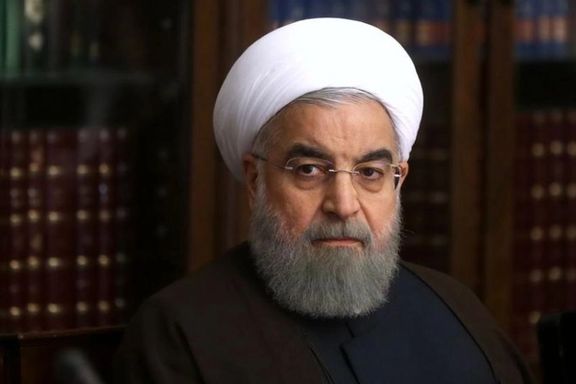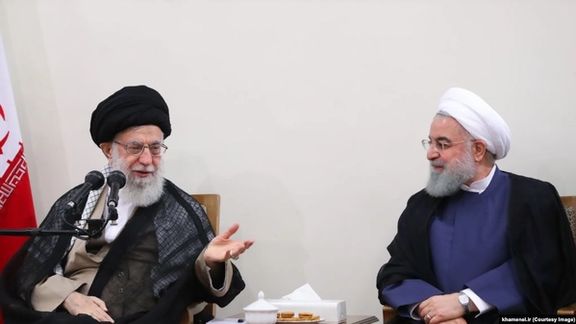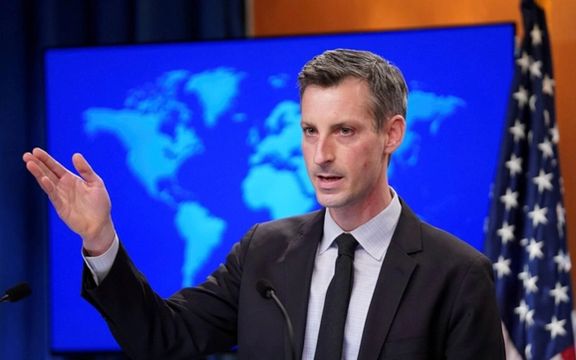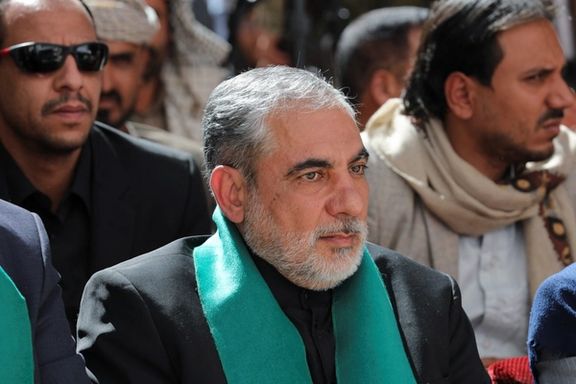Iranian Women Selling Their Hair To Cope With Rising Living Expenses

The number of women in Iran who sell their hair to get some money and be able to survive amid increasing economic hardship is increasing in the country.

The number of women in Iran who sell their hair to get some money and be able to survive amid increasing economic hardship is increasing in the country.
Iranian daily Khorasan published an article on Tuesday bawed on inteviews with women who are active in the hair trade.
Beauty salon owners and barbers are the main buyers of hair that is mainly used for wigs and extensions.
Almost all of the clients sell their hair due to financial difficulties, a barber was quoted as saying.
According to the article, the hair sellers are from all walks of life and in all ages, from 10-year-old adolescents to elderly women, but the majority are young girls from poor families. They are usually in dire need to pay bills or replace their broken phones.
According to an earlier report about selling hair in Iran, the price for someone’s shorn hair can be from $10 to $50 depending on the length, type and volume.
Three years of high inflation rising to 45 percent in recent months has impoverished many middle class families, who sometimes cannot even afford meat and dairy produxts any longer.

A leading regime insider says former President Hassan Rouhani wanted to resign after the US pull-out from the 2015 nuclear deal, but the Supreme Leader refused.
Hassan Marashi, the secretary general of the centrist Executives of Construction Party told the economic website Eghtesad News on Tuesday that Rouhani should have resigned as his government was formed based on the idea of holding a dialogue with the United States, but Iran's foreign policy needed to change track in 2018 after Donald Trump left the JCPOA.
"When diplomacy failed, there was no reason for Iran continuing diplomacy," Marashi said. Meanwhile,Marashi acknowledged that the pull-out by Trump was a hard blow to the Rouhani administration. It also emboldened Rouhani's political rivals to start attacking him.
"I told the Supreme Leader that we needed to change course after Trump's pull-out, and then I heard that Rouhani had suggested that he should resign, but the leader did not deem the decision fit for the situation," Marashi added.

In another development, while Rouhani's hardliners have been demanding to put him on trial for his failure to sort out the country's economic and foreign relations problems during his presidency, another reformist figure has suggested that he should welcome a trial.
"I would have welcomed the trial if I were him, " said Mohammad Ali Abtahi the chief of staff of former President Mohammad Khatami in an interview with the Iranian Labour News Agency ILNA on Tuesday, adding that the call for Rouhani's trial is a blame game to divert attention from the new government's failure in solving the country's economic problems.
Abtahi added that the lawmakers who found their way to the parliament with revolutionary slogans have not been able to bring about any positive change and the economic crisis has been deepening on daily basis during the past six months.
"They have also not managed to solve the problem the issue of nuclear negotiations and the markets are still waiting for a positive sign from Vienna, and this is against the Majles and the administration's claims about separating the fate of the country's economy from what happens in the course of the negotiations,” Abtahi argued.
Speaking of responsibility about the current situation addressed both to President Rouhani and former Parliament Speaker Ali Larijani, former government spokesman Ali Rabiei, who is a swell informed veteran intelligence ministry official, summarized what Iran's hardliners call "the current situation"in his Telegram Channel and on the proreform Fararu news website.
Rabiei highlighted Iran's current situation as "the undesirable situation of economic hardships that make life difficult for decent Iranians, an unprecedented inflation worsened by the instability of Iran’s currency and other markets since 2018, widespread poverty that defies all the revolutionary slogans, the social fatigue and insecurity felt by various walks of life in Iran, a rise in emigration by elite Iranians, as well as a decline in respect for revolutionary values."
Rabiei also pointed out that decline in political participation is so bad “that in a city such as Tehran only around 7 percent of eligible voters went to the polls in the 2020 parliamentary election and in some cities the number of votes cast for the winner was barely higher than the number of those who worked at the polling station."
"Add to that the loss of Iran's geopolitical advantage, having no place in the international economy and depriving the nation of the opportunities international economy and modern technology can offer," Rabiei stressed.

Iran's transport and urban development minister says no construction project will be possible due to the low budget earmarked for the ministry for next year.
During a meeting with businesspeople and contractors active in road and infrastructure construction in the country, Rostam Ghassemi added that the allocated budget can hardly provide the salaries of employees.
“Today, living conditions are such that if a worker does not receive salary for one month, he will not be able to eat even an egg,” the minister said.
Attracting private sector investments for the transportation sector is one way to address the budget shortfall the minister said but added that parliamentary authorization would be needed.
The ministry’s total budget for the next year is already 66 percent more than that of the current year, at roughly $4.8 billion at today’s market exchange rate, but high inflation in the past three years have eroded the value of the national currency.
Earlier in the month, President Ebrahim Raeesi submitted the fiscal 2022-23 budget bill to the parliament, projected to stand at about $50 billion.
This year's large budget deficit is expected to persist into next year.

The United States says insufficient progress in Iran nuclear talks has left Washington in an uncertain position as to whether the 2015 deal can be revived.
US Department of State spokesman Ned Price said during a press briefing Monday that there might be some modest progress in talks between Iran and the world powers but if the pace of diplomacy continues to lag, the the 2015 nuclear deal, JCPOA will be a corpse that cannot be revived.
A reporter asked that the Biden Administration has been complaining about Iran's slow pace in the talks but so far the US remains committed to the process.Price responded that progress in the talks “was better than it might have been, but it was worse than it should have been”, putting the US in an uncertain position as to whether the JCPOA is worth saving.
Price pointed out that the talks are going on in an atmosphere of provocation from the Iranians, saying that Iran is accelerating the pace of its nuclear program and leveling up its destabilizing activities in the region. “We can’t accept a situation in which Iran is dragging its feet at the negotiating table but accelerating the pace of its nuclear program back home”, he said.
He acknowledged the arrangement between Iran and the United Nations nuclear watchdog, the IAEA, to restore elements of transparency to international monitoring through reinstalling cameras at Karaj nuclear facility, calling it “a welcome step” but also “a step that never should have been necessary in the first place”.
He noted that there is still “a window of opportunity in which a mutual return to compliance with the JCPOA would be the best option for us, it would be the best option for the other members of the P5+1, it would be the best option for the international community”, because it would still be able to prevent Iran from obtaining a nuclear weapon.
Price, however, added that the US does not waste time and that it is discussing alternatives with partners in the region and beyond, saying, “We continue to watch what Iran does and what Iran says publicly, privately in the context of these indirect negotiations in Vienna… We’re prepared to lift sanctions inconsistent with the JCPOA, as long as Iran places itself back within the strict confines… in terms of the stringent verification and monitoring”.
Answering a question about Iranian-backed militias or proxies across the region, the spokesman said that the decision to walk away from the deal by the Trump administration in 2018 was supposed to “result in a so-called better deal, that would cow Iran and its proxies, that would leave the United States in a stronger position...And across every one of those promises, we’ve actually seen the opposite take place”.
“Across all of our concerns with Iran whether it’s its nuclear program, whether it’s support for terrorism, whether it’s support for proxies, whether it is destabilizing influence in the region, I think it is fair to say that every single one of our concerns has become more pronounced since 2018”, price said.
Defenders of a tough policy on Iran maintain that Iran will never make a deal that would permanently stop it from obtaining nuclear weapons or reduce its destabilizing activities in the region. Negotiations with and concessions to Tehran would provide time and resources for it to pursue its policies.
Price also spoke about the possibility that a nuclear deal might not address the concerns about the broader array of Iran’s destabilizing activities and behaviors throughout the region, noting that Washington is not sitting on its hands when it comes to Iran’s other “malign activities”.
“Iran’s support for armed groups threatens international and regional security. It threatens our forces, our diplomatic personnel, and our partners in the region and elsewhere. We as an administration are committed to countering the destabilizing influence and role that Iran is playing throughout the region, including with its support to proxies”, he said.
In another briefing on the same day, White House Press Secretary Jen Psaki said that due to the way that the Iranians have participated in the last round of talks in Vienna, President Joe Biden has asked the national security team “to be prepared in the event that diplomacy fails and to take a look at other options. And that has been work that has been ongoing, including in consultation with a range of partners around the world”.

Tehran should avoid miscalculations and should convince Supreme Leader Ali Khamenei to allow direct talks with the United States, pundits say in Iran.
Asr Iran, a moderate-conservative website published an article by Amir PasadehpourMonday saying Iran should take the step before it runs out of time to reach a settlement and avoid the final blow to its extremely weakened economy.
Similar opinions are more often expressed by some Iranian media outlets and public figures recently.
The article said that decisions made by Iranian nuclear negotiators in Vienna are often based on a miscalculation that avoiding direct talks with the United States delegation will humiliate America in the same way that the seizure of the US embassy in Tehran weakened the Carter Administration in 1979.
However, Pasandehpour argued that while the US public was sensitive to the hostage crisis, it really does not care much about what is taking place in Vienna. He added that miscalculating the situation could be dangerous for Iran.
Meanwhile, Pasandehpour added that unreliability of information coming from the Iranian negotiators about the Vienna talks has forced Iranian media and pundits to make judgements solely based on Western media.
During the past weeks, while the Iranian negotiating team and its leader Ali Bagherti-Kani insisted that there were no differences of opinion between the Iranian and other negotiators, it turned out every time that Western negotiators later denied Bagheri's statements.
In the latest case, while the Iranian negotiators last week said that the talks have led to desirable results, US National Security Adviser Jake Sullivan warned that there has been no progress in the talks and stressed that time was running out for any settlement. The E3 delegates also concurred with Sullivan.
Pasandehpour said that under the circumstances it was unlikely that the two sides could reach an agreement even in the next round of the talks.
Another miscalculation Iranian negotiators make is to believe have that as mid-term Congressional elections approach, the US sides, particularly those at the White House desperately need an agreement with Iran as a winning chip in the election. In fact, the author says, domestic issues are far more important in the elections than international issues.
Meanwhile, another moderate conservative website in Iran, Aftab News, highlighted the difference of opinion between the Iranian team and other negotiators about whether Iran has accepted the agreements made in the first six rounds of the talks as a basis for further negotiations. The website wrote that it is not yet clear whether the two sides are moving toward an interim agreement or even the previous agreement is falling apart.
Jalal Sadatian, a former Iranian ambassador to the United Kingdom, told Aftab News that negotiators usually approach each other with some distrust. That is how Western negotiators look at Iran and they have made Bagheri aware of it. Moreover, Iranian analysts believe that Tehran has no roadmap for the talks about the nuclear issue, and matters relating to human rights and terrorism.
Iran also wants a guarantee that the US will never leave a new agreement. Sadatian said it is highly unlikely that the current President of the United States can provide a guarantee that on behalf of a future president.
Foreign relations commentator Ali Bigdeli told Aftab News, "Bagheri has said that Iran and Western countries agree over 80 percent of the current draft agreement. This was the same 80 percent agreement that was made under the Rouhani administration." In other words, there has been no progress in the talks since the new negotiators took over several weeks ago.

Two days after his return from Yemen, Iran’s ambassador with Houthi rebels has died of Covid-19 complications, the foreign ministry announced early on Tuesday.
Hassan Irloo (Irlu) had left Yemen reportedly on a plane sent by Iraq, in coordination with Saudi Arabia that maintains an air blockade over Yemeni territories controlled by Iran-aligned Houthis.
The Iranian foreign ministry tweeted that Irloo passed away due “belated cooperation of some countries,” saying that when he returned to Iran his health had already deteriorated.
Last week controversy ensued after a Wall Street Journal report said that the Houthis had asked Iran to withdraw Irloo. Both Iran and the Houthi leadership denied the report, insisting that the ambassador suffered from Covid and needed to receive medical attention in Iran.
Foreign Ministry Spokesman Saeed Khatibzadeh had said in a tweet Saturday that he was being brought back home for Covid treatment "with the assistance of some regional countries" and thanked "the countries that contributed to this humanitarian measure."
However, US State Department Spokesman Ned Price on Monday commenting on Irloo's departure said, "We hope it is a sign that Yemenis understand the profoundly destabilizing role that Iran has been playing in their country for some time now."
Irloo was a member of Iran's Revolutionary Guards (IRGC) with close ties to Lebanese Hezbollah. He was sanctioned by the US Treasury Department in December 2020 due to his connections with the IRGC's Qods Force.